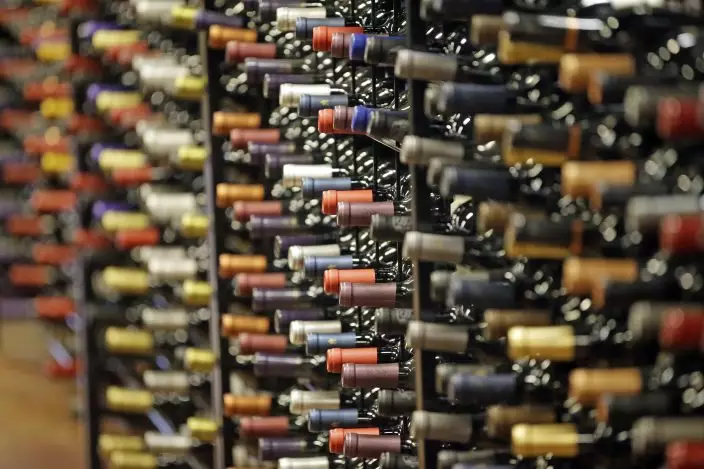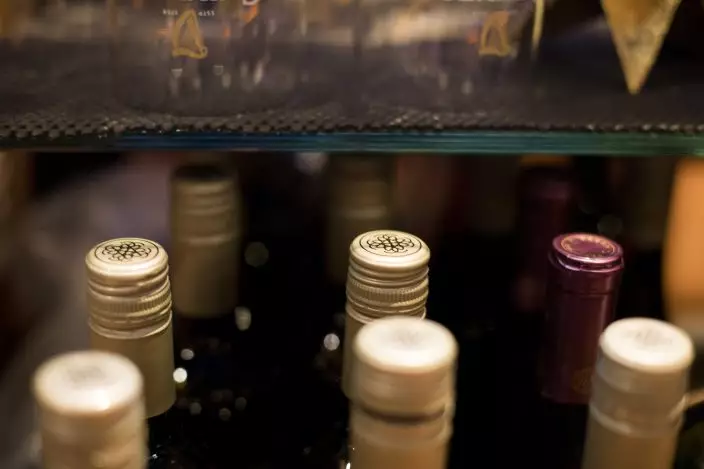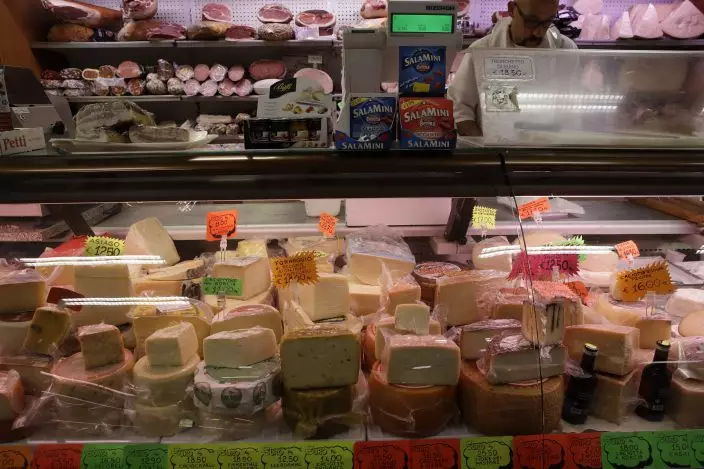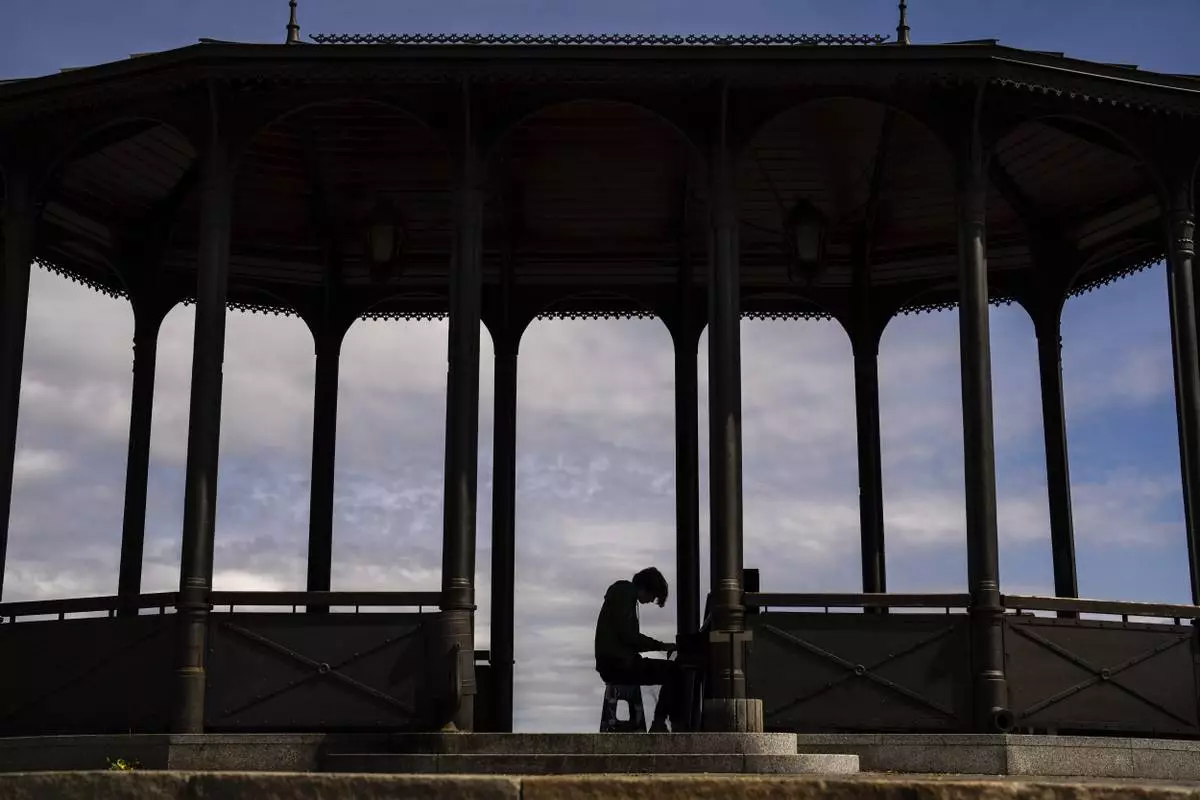The tariffs the Trump administration is about to impose on wine, liquor and cheese from Europe couldn't come at a worse time for small retailers.
"It's kind of scary in the sense that we're getting to the holiday season," says Joseph Kakos, owner of Kakos Fine Wine & Spirits in Birmingham, Michigan. "October, November and December are the time when you really make your money for the year."
No one expects consumers to completely abandon Bordeaux and other wines from France, Scotch whisky or cheeses like Parmesan or Roquefort when the 25% tariffs take effect Friday. Still, Kakos says, shoppers may turn price conscious just as shelves are well-stocked for the holidays.

FILE - In this June 16, 2016, file photo, bottles of wine are displayed during a tour of a state liquor store, in Salt Lake City. The tariffs the Trump administration is about to impose on wine, liquor and cheese from Europe couldn’t come at a worse time for small retailers. (AP PhotoRick Bowmer, File)
"People come in with the perceived idea of, is this more expensive? Has this gone up?" he says.
Wine retailers, distributors and importers already expect some customers to seek reds and whites from countries whose products aren't being taxed. And any signs that customers are balking at higher prices will force retailers to absorb their increased costs.
The tariffs are mostly on food and alcoholic beverage products such as cheese from Britain, Switzerland and Italy; olive oil from Spain; Scotch whisky and French, Spanish and German wines. They're also being imposed on equipment from kitchen knives to large aircraft. The administration is imposing them in retaliation for the European Union's subsidies of aircraft maker Airbus, the competitor to the U.S. producer Boeing.

This Dec. 25, 2018, photo shows wine bottles at the bar at a bowling alley in Eagle, Colo. No one expects consumers to completely abandon Bordeaux wine from France, Scotch whisky or cheeses like Stilton, Roquefort when the tariffs take effect Friday, but retailers as well as their importers and distributors are aware that buying habits may change if shoppers fear they’re now paying 25% more for their favorite drinks and delicacies. (AP PhotoJenny Kane)
The tariffs will be slapped on goods that arrive in the U.S. from Friday onward. One bit of good news is that much of the food and beverages to be sold during the holiday season is now in the country and headed to store shelves, so retailers generally won't have to suddenly come up with extra cash to pay for holiday merchandise.
"Most people are going to be OK" in terms of buying for the holidays, says Joe Gellert, president of World's Best Cheeses, a distributor with operations in New York and California.
But retailers who are his customers are worried about the long-term impact of the tariffs; they're hoping for trade talks between the U.S. and EU and that the Trump administration will withdraw the tariffs as it recently did with some imposed on Chinese goods.

FILE - In this Oct. 3, 2019, file photo blocks of Italian cheese are on sale in a deli in Rome. The tariffs the Trump administration is about to impose on wine, liquor and cheese from Europe couldn’t come at a worse time for small retailers. (AP PhotoAlessandra Tarantino, File)
And while retailers believe customers willing to spend top dollar on upscale products like Bordeaux and single-malt Scotch will be willing to pay extra to get the labels they want, the business owners aren't complacent.
"We have not yet made any changes in respect to tariffs being implemented but we will be sure to keep an eye on the market," says Giles Cadman, owner of Golden West International, a San Francisco-based fine wines retailer.
Price-sensitive customers are aware they have many other choices when it comes to purchases like wine and cheese, so owners may need to change the products that they stock. Shoppers may opt for buy wine from a country like South Africa or Chile whose products are not subject to tariffs, or they may switch from a single-malt Scotch to a cheaper blend or domestically made bourbon. Instead of Stilton, they may choose an artisanal cheese from Vermont.
"We will have to make changes to our mix because in this competitive wine market, it's not easy to pass rising costs to retailers and consumers," says Brett Vankoski, wine director for Latitude Beverage, a wine seller headquartered in Boston.
Perhaps a bigger concern is what will happen after the holidays. People in the wine business are concerned that if the tariffs are still in effect, sales of popular French rose wines will fall next summer. Those wines are scheduled to be shipped to the U.S. early in 2020.
"French rose is one of the fastest-growing wines in the country and is a big contributor to the growth of our company and the industry as a whole," says Kevin Mehra, CEO of Latitude Beverage. "The tariff has the potential to slow that growth."
Retailers, distributors and importers have strategies to cushion the impact of the tariffs and avoid having to charge consumers the full 25%. Each business in the distribution chain can agree to absorb a portion of the tariff.
"One strategy is to raise the price on everything 1% and marking up these items (with tariffs) only 5%," Gellert says. Another tack is for a distributor or retailer to look at merchandise critically, with an eye toward winnowing out products they really don't need on their shelves, he says.
Retailers have less pricing leeway in states where alcoholic beverage control agencies regulate wine, liquor and beer prices and the timing of price increases.
In New Hampshire, for example, prices are set twice a year. "This could be detrimental to companies that will now lose money on products affected by the tariffs for potentially up to six months," Mehra says.
But retailers of products like wine and cheese have advantages over, for example, companies that need to import steel and aluminum from the EU that's also being taxed by the Trump administration. It's not easy to find metal and metal products without tariffs, but food and alcohol purveyors have many options.
Cadman noted that even if a particular French wine becomes too pricey, there are plenty of similar ones from other countries. Sauvignon blanc, a white wine produced in California and New Zealand, is similar to France's Sancerre.
And, Vankoski noted, another huge European producer isn't being hit by import duties.
"Italian wines are not impacted by the tariffs," he says.
Follow Joyce Rosenberg at www.twitter.com/JoyceMRosenberg . Her work can be found here: https://apnews.com










